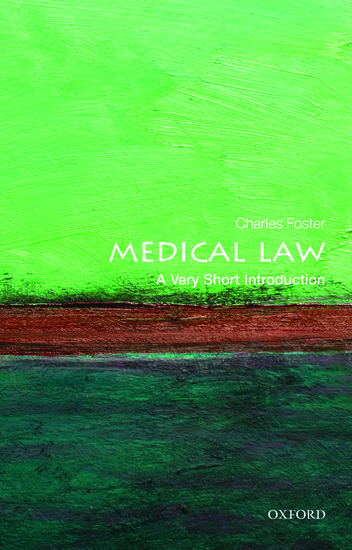
By Charles Foster
By the standards of most books, the Very Short Introduction to Medical law is indeed very short: 35,000 or so words. As every writer of a VSI knows, it is hard to compress your subject into such a tiny box. But I wonder if I could have been much, much shorter. 88 words, in fact.
Here’s my re-write:
1. Everyone has the right to respect for his private and family life, his home and his correspondence.
2. There shall be no interference by a public authority with the exercise of this right except such as is in accordance with the law and is necessary in a democratic society in the interests of national security, public safety or the economic well-being of the country, for the prevention of disorder or crime, for the protection of health or morals, or for the protection of the rights and freedoms of others.
This would hardly be saleable as a VSI, but is there anything else to say? Certainly it’s arguable that the rest of what we describe as ‘medical law’ (at least in a publicly funded healthcare system) is simply commentary on it.
The words, of course, are those of Article 8 of the European Convention on Human Rights. It’s the most elastic of all the Convention articles. It stretches to places of which the original draftsmen (probably thinking of preventing phone tapping and other Big Brother-ish activities by the State’s shadowy men in raincoats) would never have dreamed.
It effortlessly and unsurprisingly encompasses confidentiality. It’s not hard to see how it can generate a right to informed consent, determine what should happen to my body parts, have a fair stab at drafting a definition of death, and, generally, require clinicians to act in all their dealings with me in just the sort of respectful way that makes a good doctor a good doctor. It has been found to extend to the end of life, enabling me (so long as the criteria in 8(2) are satisfied), to end my life at the time and in the circumstances that I choose. It’s a structure built by autonomy and dignity, and is now their natural home, from which they preside over the law.
Article 8 doesn’t just let me do things. It prefers to permit than to deny, but it’s capable, using the language of 8(2), of stopping me do things too. If I want to nail my genitals recreationally to a piece of plywood, or to ask a surgeon to cut off all my limbs because that’s this season’s look, it’s likely to have something stern to say.
But ultimately some commentary is necessary. The tension between 8(1) and 8(2) (which is the real tension in much medical litigation) needs to be measured and described. Fundamental and parthenogenetically fecund though it is, perhaps Article 8 needs to acknowledge its need for insemination by ideas such as personhood and the right to reproduce, and its reliance on other principles (the right to life, for instance, embodied in the law of murder, manslaughter, and the prohibition of assisted suicide). Perhaps, too, duties aren’t just the flip side of rights, and perhaps we need somehow to oblige doctors to get out of bed in order to be respectful. We all know that highly elastic principles and people tend not to be great on the details.
Having looked at it, I’m reassured that the remaining 34,912 words were justified.
Charles Foster is a Fellow of Green Templeton College, University of Oxford, a tutor in medical law and ethics at the University of Oxford, and a barrister (practising in medical law) at Outer Temple Chambers, London. He read law and veterinary medicine at the University of Cambridge. He is the author, editor or contributor to over thirty five books, including Medical Law: A Very Short Introduction.
The Very Short Introductions (VSI) series combines a small format with authoritative analysis and big ideas for hundreds of topic areas. Written by our expert authors, these books can change the way you think about the things that interest you and are the perfect introduction to subjects you previously knew nothing about. Grow your knowledge with OUPblog and the VSI series every Friday and like Very Short Introductions on Facebook.
Subscribe to the OUPblog via email or RSS.
Subscribe to only VSI articles on the OUPblog via email or RSS.


Recent Comments
There are currently no comments.